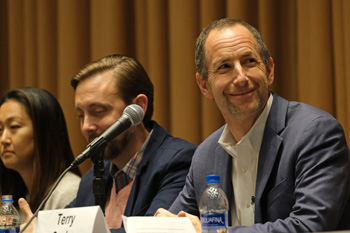General
APHA’s Public Health Film Festival kicks off with a powerful message of hope
8 Billion Angels OFFICIAL TRAILER from terry spahr on Vimeo.
“When you borrow something, you always give it back in better shape than when you got it.”
Those are words from “8 Billion Angels,” the featured film at yesterday’s kick-off session of the APHA Public Health Film Festival. While climate change often conjures up catastrophic images of melting ice sheets crashing into the sea, rivers of plastic and extreme weather, the new film encourages viewers to see the future through a more hopeful lens.
 “A lot of films leave you at the end saying ‘oh my god we’re doomed,’” said Terry Spahr, the film’s executive producer and a speaker at the APHA Annual Meeting session in Philadelphia. But for Spahr, documentaries about climate change that focus on the damaging impacts, but don’t address solutions, are just frustrating.
“A lot of films leave you at the end saying ‘oh my god we’re doomed,’” said Terry Spahr, the film’s executive producer and a speaker at the APHA Annual Meeting session in Philadelphia. But for Spahr, documentaries about climate change that focus on the damaging impacts, but don’t address solutions, are just frustrating.
“8 Billion Angels” — a title that refers to the current global population — approaches issues such as climate change and sustainability through the issue of population overgrowth, or what Spahr described as a “human impact crisis.” From the producers’ perspective, among the most effective solutions to planet-wide crises such as global warming is empowering and educating girls and providing access to family planning resources.
“It’s an authentic path to sustainability,” Spahr said in an interview before the session.
The film celebrates Kerala, a state in India where education is free and compulsory for boys and girls. Kerala has relatively high rates of literacy, and good maternal and infant health. And its population is stable, potentially trending towards negative growth over the next few years.
While the film touts a positive message and offers solutions, that doesn’t mean it avoids the harsh realities of our changing planet. In the first part of the film, viewers travel from Maine, where ocean acidification is harming the ecosystem and economy, to the American Midwest, where water wells are overburdened by a swelling farm industry, to India, where river pollution can get so bad that the water’s only suitable use is as an industrial coolant.
For Sphar, meeting an oyster farmer in Maine was a particularly poignant moment in the making of the film.
“He was so upset because he was expecting his first grandson in about a month,” Sphar said. “He looked at us in the camera and he said, ‘I’m overwhelmed by how difficult this problem is that we are going to be facing.’”
“8 Billion Angels” is slated for release in spring 2020. Learn more at www.earthovershoot.org.
The APHA Public Health Film Festival will host screenings and events throughout this year’s APHA Annual Meeting at the Michael Nutter Theater inside the Pennsylvania Convention Center. Find a complete schedule at www.apha.org/filmfest or search “Film Festival” on the APHA 2019 app.
Photo of Terry Spahr at yesterday's Annual Meeting session by Aaron Warnick, courtesy The Nation's Health


